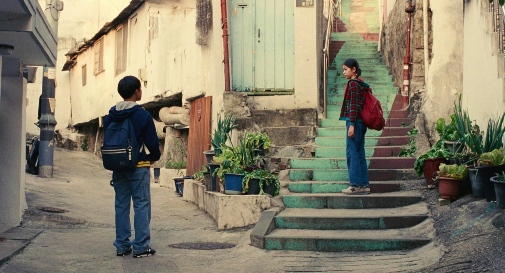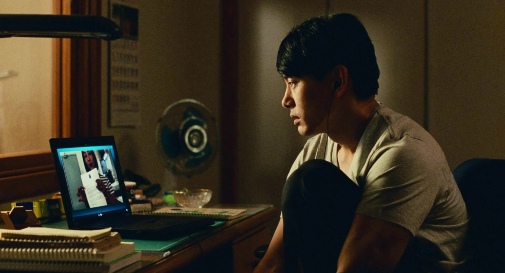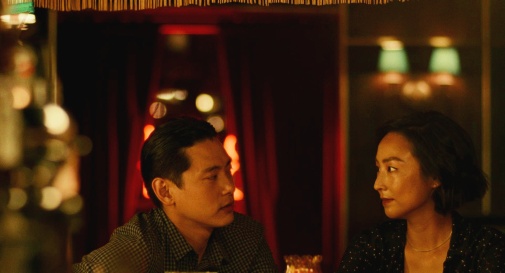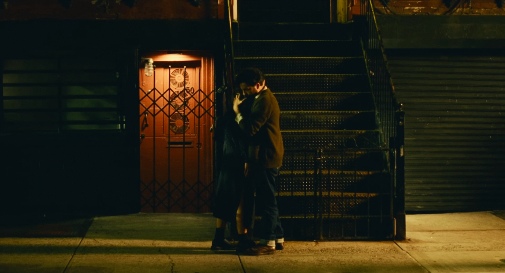No two people feel the exact same way about any film. Thus, Team Experience is pairing up to debate the merits of this year’s Oscar movies. Here's Mark Brinkerhoff and Lynn Lee on Past Lives...

MARK: Past Lives, fresh off its big wins at the Independent Spirit Awards, is, I think it’s safe to say, the indie darling of this Oscar season. American Fiction aside, no 2023 indie film seems to endure with as much feeling in cinephile's imagination than Past Lives, more than a year after its premiere at Sundance. But maybe I’m projecting here, because I love, LOVE, love! Past Lives, the beautiful, heartfelt film debut of real-deal filmmaker Celine Song. What say you?
LYNN: Past Lives is absolutely this year’s indie movie that could – the one that premiered with relatively little fanfare at Sundance only to build a tidal wave of support over the course of 2023. Not just support: love like yours, and not just love from critics, but from regular moviegoers. I can’t tell you how many friends or even casual acquaintances have told me, unprompted, that Past Lives was the best film they’ve seen in a long time...
Which makes me a little sad that I do not share the love. Don’t get me wrong, there’s a lot I admire about the film. It’s beautifully acted, and its themes are eminently relatable. Song effectively captures certain moods – regret, ennui, longing – with a delicacy that transcends the relatively spare dialogue and even sparer physical action. But something about it held me at a perpetual distance; it never hit me in the gut. I think my fundamental problem was that I never really felt what drew Nora and Hae Sung together, enough to tie them together across decades.

What am I missing? Am I just not enough of a romantic?
MARK: Not necessarily. Ennui might be the best way to describe it, particularly the headspace of Hae Sung (the sublime Teo Yoo), as it’s certainly a low-frequency vibes film—melancholic and moving—for those on its wavelength. And the vibes of Past Lives do linger, for me anyway. Yet, even having that response as a viewer may very well say more about my headspace than anything; identification, if not outright projection. Like the equally bittersweet and beautiful All of Us Strangers, Past Lives stirs and stimulates feelings. It’s the “what if” in life that wasn’t meant to be. But no one can fault you for an altogether different reaction. That’s personal.
LYNN: Interesting you mention All of Us Strangers, because that movie definitely hit me in the gut, hard. While it too is about missed connections and longing for experiences never had, it broke my heart in a way that Past Lives never came close to doing – perhaps because it’s also much more about grief and actual rather than hypothetical loss. Still, one might assume someone of my background – second generation Korean American woman, married to a white man – would relate much more instinctively to Nora than to Andrew Scott’s gay white British man. Yet it was the latter who dipped deepest into my well of empathy.
Teo Yoo is phenomenal in Past Lives, but his character is (perhaps by design) so much more slenderly written than Nora that I felt like we only ever see him through her eyes. Even when we’re ostensibly glimpsing scenes from his life, he comes off as a character in her story.

MARK: It’s true that, while a two-hander, Past Lives is led by the strong hand, the narrative POV, of Celine Song through the analog of her own experience, Nora. Hae Sung does not get the same treatment, though Yoo does a whole lot to imbue his character with presence and deep feeling. It’s like Hae Sung is floating through time and space, looking for something grounded he perceives in Nora—the memory (or hopeful imagination?) of her, at least.
LYNN: That’s a lovely way to put it, though it also captures why so much of Past Lives felt…insubstantial to me. The first act didn’t (for me) establish why Nora and Hae Sung’s connection as children was so meaningful, and the second didn’t do much more to establish what about their virtual reconnection kindled such a spark that they’d consider rekindling it another 12 years later. Understanding the film’s loosely based on Song’s own life, the structure felt overly composed, if you will. Most of it felt like setup for the third act – which, in fairness, rang so true that it almost convinced me to overlook my skepticism through the first two thirds. Almost, but not quite.
MARK: I see your point. We’re not always the most reliable narrators of our own lives and lived experiences, especially those in childhood. Nora (the wistful, winsome Greta Lee) herself must acknowledge that. It’s true that fond memories of early connections, when brains are still developing alongside habits and scars, have a way of lingering—even crystalizing—into adulthood. They’re perfect because they’re in the past. And, boy, can they be hard to compete with (as the film’s third-wheel American surely knows!).

There’s a simplicity and authenticity to young relationships, like Nora’s and Hae Sung’s, that seems so bittersweet in the face of a messy, modern marriage like Nora’s and Arthur’s, with its inherent challenges and complexity. Past Lives mines the depths of that well, though maybe I’m guilty of reading way too much, too deeply, into the story on the screen.
LYNN: And maybe it says something about my headspace that the character I empathized with most was Arthur, the third wheel! John Magaro does a great job conveying the anxieties of the husband who wants to give Nora space yet can’t hide – and can only partly defuse through humor – his palpable fear of losing her. It’s unfortunate, though perhaps poetically fitting, that Magaro’s performance hasn’t received nearly the recognition that his co-stars have.
MARK: Magaro is an unsung MVP of the film, no question. It’s an impossible situation—to trust and cede but not recede—and Magaro plays Arthur’s tricky predicament beautifully. For me, it worked overall, which made Nora’s slow walk back to their life as much as their physical apartment that much more affecting. I’ve been there, the there where the present/future relationship must exist on a different plane than the one who got away, rather than co-exist. Because that’s the only way forward.

Previous Split Decisions: